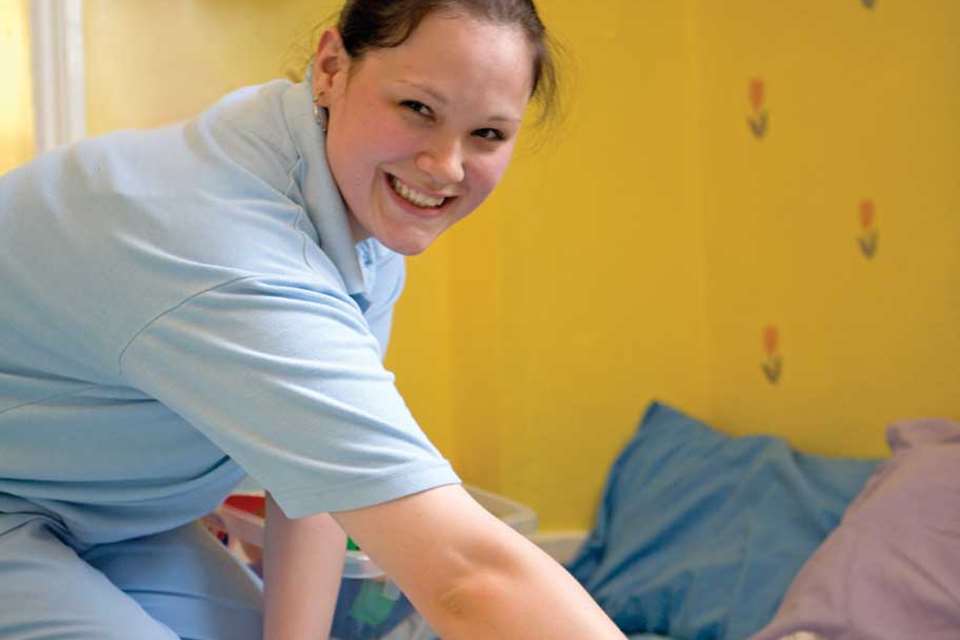Nursery Management: Exclusive: Staff health - Suffering in silence
Katy Morton and Hannah Crown
Monday, March 23, 2015
The first-ever dedicated survey of the impact of nursery work on physical health is in. Katy Morton and Hannah Crown report.
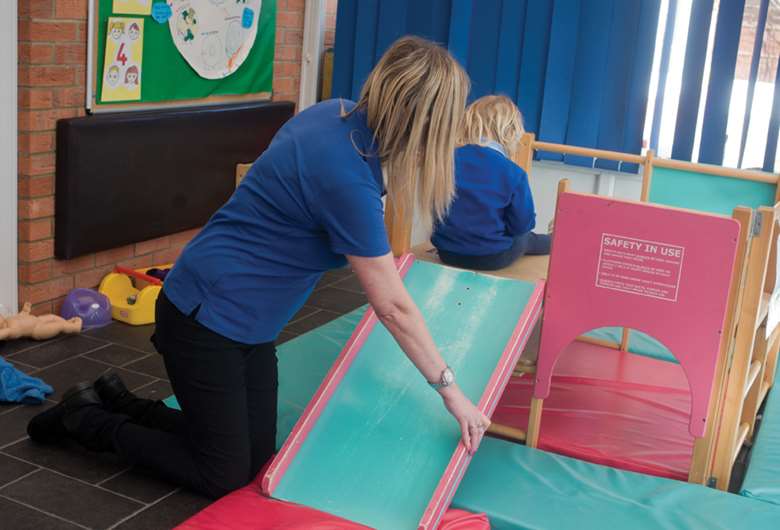
Childcare workers are experiencing an epidemic of back, neck and knee pain, but many choose to suffer in silence, a Nursery World investigation has found. Our survey of nearly 600 practitioners found that more than 70 per cent experience work-related physical strain at least once a week - more than a quarter suffer daily.
Over a third (40 per cent) said they have to take pain relief at least once a week as a result. Yet 72 per cent have chosen to not tell their employer.
The survey, which is the first to focus solely on the physical health of early years staff, found that practitioners experience a range of discomforts while at work - with 85 per cent of respondents suffering work-related back pain, and 66 per cent of them knee pain.
While nearly 90 per cent of respondents were under the age of 55, a third of them believe their physical discomfort has caused or contributed to a long-term disorder.
A number are suffering from spinal problems such as scoliosis (curvature of the spine), sciatica and slipped discs. Others are affected by hip conditions and osteoarthritis.
One practitioner, in the 35-44 age bracket, said she had to leave the nursery she previously worked at because her consultant said it was the only way her severe osteoarthritis would improve.
According to Lorna Taylor, a paediatric physiotherapist and director of Jolly Back, the results are surprising in this age range. 'Normally this level of back and joint pain (cumulative strain) would not affect people until at least their sixties', she says.
'I think we have an issue with young working people. We now have a generation in the workforce that has had more sedentary lifestyles and is more predisposed to injury,' Ms Taylor adds.
Richard Graveling, principal ergonomist at the Institute of Occupational Medicine, says while the prevalence of musculoskeletal disorder (MSD) symptoms is 'high', it is not exceptional because studies of office workers have shown similar levels experiencing MSD symptoms. He adds, 'That is not to say that it is acceptable, however.'
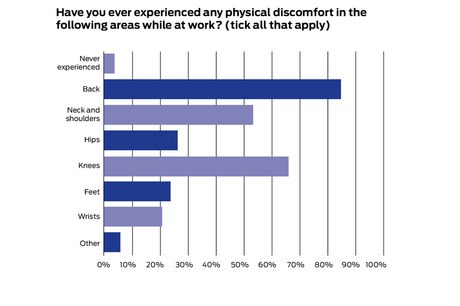
Contributing factors
Sitting on child-sized chairs is the biggest contributor to practitioners' physical discomfort, our survey found. This is closely followed by kneeling at child-sized tables or sitting on the floor.
One respondent said, 'The doctor diagnosed my problem due to years of sitting on chairs that are far too small for adults.'
Carrying children, lifting and moving equipment were also cited as causes of discomfort, as were assisting children with going to the toilet and feeding, changing nappies and/or clothes and pushing a buggy.
Another respondent (aged 55-64) said, 'I have problems with tendons in my hips from sitting on small chairs. I need physio and an ultrasound. I also have calcific tendonitis in one shoulder from lifting, which needs physio and keyhole surgery.'
Another comment read, 'I have osteoarthritis in my hands, which I put down to fastening the zips and laces of 24 children several times a day over 14 years.'
According to the Health and Safety Executive (HSE), manual handling is one of the most common causes (responsible for more than a third) of injuries at work, including work-related musculoskeletal disorders.
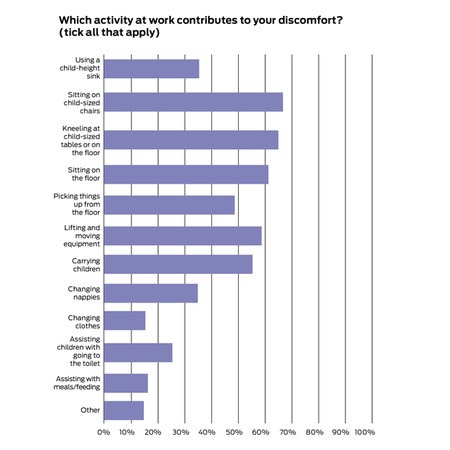
Reporting pain
Our survey identified a culture of under-reporting, with 62 per cent of respondents saying work-related pain is 'just part of the job'.
One said, 'It's just part of getting old in a physical job.'
Nearly a fifth, 18 per cent, felt reporting their discomfort would be 'pointless as no action would be taken by my employer', while 14 per cent said it could 'jeopardise my career'.
One respondent said, 'My manager would think I was complaining and maybe have an ulterior motive.'
Dr Graveling says such under-reporting is 'worrying'. 'Muscle aches and pains might be part of growing old, and some risks might be part of the job, but employees shouldn't give up without at least trying to get their employer to do something about it.
'Storage areas can be re-designed to make it easier to handle heavy or awkward pieces of equipment; the design of changing areas can be improved to reduce the need for excessive stooping. Some risks, such as carrying children, might indeed remain "part of the job", but staff shouldn't assume this to be the case,' Dr Graveling says.
Nursery World's survey also reveals a lack of awareness among early years staff about what their employer can do to help with work-related physical discomfort and injuries. Just over a fifth said they either did not know they could report their pain, or were unsure whom to tell.
On top of this, a quarter of respondents admitted not knowing if their employer has a system for recording work-related physical discomfort.
'Most employees know they can report slips, trips and falls, but not cumulative strain. It's not acceptable to experience any pain,' says Ms Taylor. 'There is a huge culture across the early years and education sector not to report discomfort, and this needs to change. If it isn't reported, it cannot be improved.'
How staff rate their employers
Perhaps surprisingly given the above results, more than half of respondents rated their employer's effectiveness at ensuring their physical wellbeing as 'effective' or 'very effective'. The remaining 44 per cent ticked 'ineffective' or 'very ineffective'.
Ms Taylor says the findings suggest that employees are not aware of what their employer can do to improve things for them. 'The problem is that employers aren't accountable to anyone for cumulative strain. The HSE only steps in if someone reports a problem and, as the survey shows, early years staff are unlikely to do this. While it is a legal requirement for employers to have an accident book and first aid on site, they are not obliged to have a system in place to report cumulative strain,' she says.
The HSE told Nursery World that though it does provide guidance, it is a regulator and the onus is on the employer to minimise risk to staff.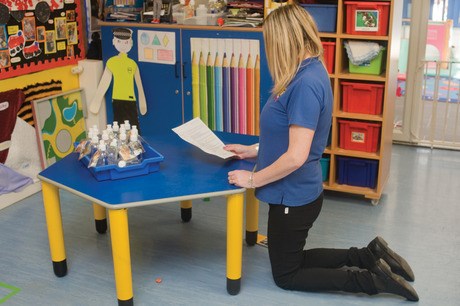
What is required by law
In our survey, 39 per cent of early years workers say they have not had manual-handling training.
Ben Posford, head of catastrophic injury at Osbornes Solicitors, says while the requirement to provide training in manual-handling techniques is often thought not to be mandatory, it is directly related to the need to supply staff with 'suitable and sufficient' risk assessments. Failure to do so is a criminal offence.
Mr Posford acted for Aileen Cooper, who in 2013 won a legal battle against nursery group Bright Horizons after being left with a spinal cord injury when using a faulty cot at one of its settings.
He argues that a 'failure to provide manual-handling training is a breach of the Manual Handling Operations Regulations 1992 because the employer has failed to take "appropriate steps to reduce the risk of injury to the lowest level reasonably practicable"' as set out in law.
According to the HSE, an employer's duties also include mitigating a problem that is causing or aggravating existing symptoms in an employee, such as by providing protective equipment or referring the employee to an occupational health provider.
Mr Posford says that 'genuine risk assessments' are 'attempts ... to consider all the risks associated with particular jobs, and to then implement proportionate and realistic means whereby the risk of injury is minimised'.
He adds that the culture of risk-assessing the likelihood of injury is 'fairly well entrenched', but 'where most employers go wrong is that they either forget to regularly remind employees and managers about what the assessments say, or managers fail to follow the guidelines in allocating daily tasks to staff.
'Liability for causing an injury cannot be avoided where, for example, a risk assessment stipulates that a moving and handling task should be completed by two people but only one person is assigned to the task.'
In our survey, 58 per cent of people reported that their employer 'does not have a system for recording work-related physical discomfort'.
Mr Posford says, 'All employers should keep an accident book, although most employees never need to use it and therefore have no idea it exists.
'Whenever an employee does report back pain, for example, a record should be kept of the discussion by the employer, and a GP ought to confirm that an employee is fit to work, failing which alternative and less demanding duties should be made available to the employee.'
Generally, he says, 'record-keeping is extremely important'. This includes proper work equipment maintenance and inspection records. 'Having provided staff with appropriate training, it is unwise not to keep a record to help evidence that an employer's duties have been taken seriously,' he adds. Employers also have a duty to check up regularly on the health of staff undertaking manual-handling activities.
Dr Graveling says while manual-handling training can help, provided it is properly explained and then adopted, it isn't an answer in itself.
He advises, 'Lifting a weight away from the body creates four to five times the strain of the same load lifted close. Don't forget that, when stooping, you are also lifting your upper body weight.'
Sandra Beale of Your Nursery HR advises discouraging staff from lifting and carrying children who can walk. She adds that managers shouldn't shy away from 'gently reminding' their employees of the correct way of lifting and handling, and that a health and safety policy must be in place.
'If your staff go on to experience pain or discomfort from an incident in the setting, training should be repeated, in some cases several times,' she adds.
'The most important way to avoid accidents is to learn from every experience,' says Mr Posford. 'It is unforgiveable to ignore the reasons why someone is injured and to have another staff member hurt afterwards in the same way, simply because the lessons had not been learned or no one took responsibility for changing the working method.
'The only way an employer protects themselves from compensation claims is not to cause injury to their employees through unsafe equipment or working practices.'
CASE STUDY: HOLLY MANNING, NURSERY MANAGER
Holly Manning, a 22-year-old nursery manager who has worked in childcare for five years, suffers from chronic back and knee pain.
While Ms Manning's back condition is hereditary and developed when she was at school, she says 'the job has certainly not helped'.
Sitting and kneeling on hard floors has also damaged her knees.
She now sees a chiropractor and a physiotherapist regularly, which she says is costly, as well as going to the gym four times a week to keep her muscles supple.
When her back and knee pain flares up she takes pain relief twice a day.
Ms Manning says that her muscles often seize up after sitting on the floor with the children and she struggles to get up.
'Doing up the children's shoelaces, bending over small tables to cut up their meals and carrying twoand three-year-olds have worsened the problem with my back,' she explains.
However, Ms Manning says that her employer has been very understanding and supportive.
She explains, 'When I am experiencing pain I tell our operations director, who allows me to take time away from the children.
'He was aware that I had back problems before I started with the company.'
Ms Manning says every year staff at the nursery receive training on manual handling, including how to carry children and pick up equipment correctly.
New employees are also required to declare if they have any medical conditions or health problems - information that is updated annually.
CASE STUDY: BEVERLEY ADAMSON, CURRICULUM MANAGER AT YOUNG EXPLORERS CHILDCARE IN STOKE-ON-TRENT
56-year-old Beverley Adamson suffers from tennis elbow, knee problems and lower back pain. She has worked with children for 40 years.
'Over the past ten years, I have started to suffer with lower back problems, which my doctor put down to my job - lifting children and sitting for too many years on chairs made for children. Continuously crouching down to a child's level, and children jumping on my back, have also contributed to my pain,' she reveals.
'I haven't had to take any time off, but do take pain relief occasionally. I just prefer to carry on with work as I find sitting down or standing can make it worse,' the Young Explorers Childcare curriculum manager explains, adding that she does put some of her pain down to her age.
'My manager is very understanding of my conditions and has provided adult-sized chairs within the nursery rooms for staff to sit on,' she says.
Ms Adamson says she received manual-handling training at a previous setting and makes sure that young practitioners at her current setting know how to lift equipment correctly.
'Younger staff are constantly slouching, and I'm amazed at the number who are unable to sit cross-legged,' she says.
More information
The HSE's website has information for employers and employees on manual handling and health and safety law - www.hse.gov.uk.
Survey sample
Our survey was conducted as an open invitation to all readers and attracted 589 respondents, all of whom work in a childcare setting.
Close to half of all respondents work in private, voluntary and independent nurseries; around 22 per cent in pre-schools; and 18 per cent in nurseries run by schools or after-school clubs.
More than two-thirds (69 per cent) of respondents have worked in childcare for more than ten years. Of these, 28 per cent have worked with children for more than 21 years.
Questions were devised by Nursery World and Lorna Taylor of Jolly Back, www.jollyback.com.




